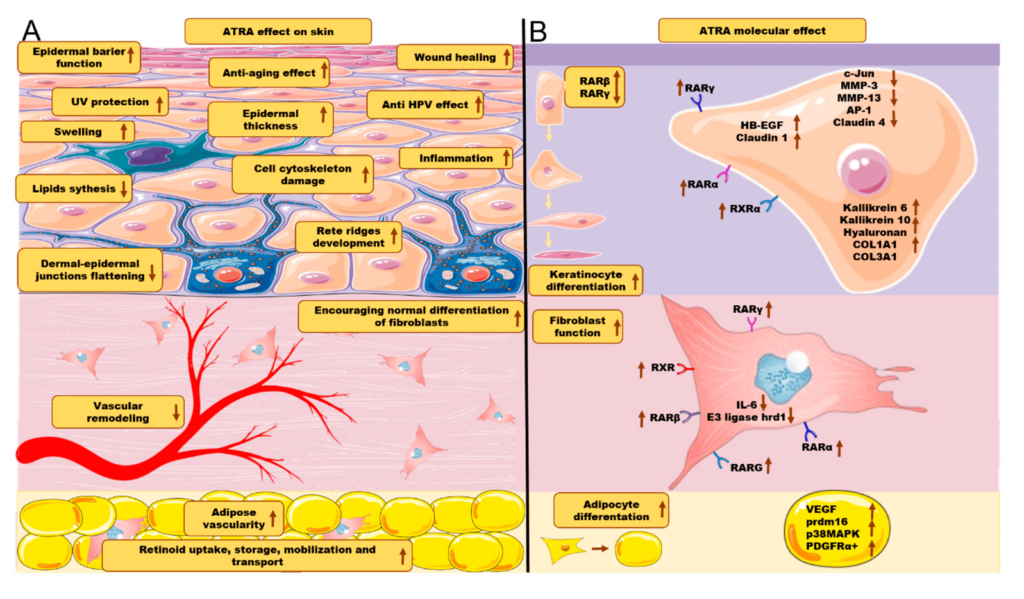Retinoids: their power and how to take advantage of them.
What are retinoids?
Retinoids is a vitamin, Vitamin A, and that’s why retinoids are an important part of nutrition, for our whole body including our skin. Vitamin A has been recognized as such since 1920, and it is required for vision, skin health, immune function, bone metabolism and embryonic development (that’s why excess vitamin A can affect embryonic development). The alpha, beta, and gamma carotenes can be transformed into vitamin A within our body.
What can they do for your skin?
Will help control acne because it accelerates skin renewal and normalizes keratinization
Will help reverse the effects of sun damage on the skin, improving skin texture, smoothing wrinkles, and normalizing pigmentation

Figure: retinoic acid effect on skin layers and skin cells. (B) molecular effects. Arrows directed upwards represent either an increase or upregulation. Arrows directed downwards represent either decrease or downregulation. The figure was created using SMART (Servier Medical ART) modified graphics, licensed under a Creative Commons Attribution 3.0. Generic License. See Szymański et al. 2020.
How retinoids can hurt your skin (if you are not careful)
Hundreds of different chemicals share some of the activities of vitamin A, but their different structures also mean that side effects will be different. When it comes to synthetic derivatives, like isotretinoin, part of the effects may be due to its partial conversion in the body into retinoic acid. However, there is more to the mechanism of action, and this part of the story is still a matter of investigation (in other words, we have no idea how it works).
Skin irritation, peeling, redness, sensitive skin.
What to avoid if you are using a vitamin A product.
- The sun. and wear sunscreen
- Exfoliation, physical or chemical. Vitamin A is already working at skin renewal, if you add ascorbic acid or other alpha hydroxy acids you should expect trouble.
- Drying products, anything containing alcohol (like ethanol)
Remember that retinoids need to be accompanied by other actives
Just like the epidermal growth factor is a signal to the cell; retinoids are signals. When the receptor receives the signal, the cell will try to follow instructions but will need nutrition to do its job. The nutrition will come through the blood that irrigates your skin, but as we age, we get less nutrition and start needing topical supplementation. This is why Skin Actives products are fairly complex.
References
Szymański, Ł.; Skopek, R.; Palusińska, M.; Schenk, T.; Stengel, S.; Lewicki, S.; Kraj, L.; Kamiński, P.; Zelent, A. Retinoic Acid and Its Derivatives in Skin. Cells 2020, 9, 2660. https://doi.org/10.3390/cells9122660
Other relevant blog posts
Which actives complement retinoids?
Retinol, retinoic acid, retinyl ester, retin-A…… why so many retinoids?
Plants and the chemicals they make. Retinoids can be both gentle and effective.
What a difference chemical structure makes!
